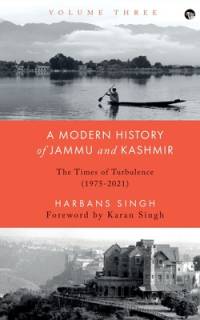A MODERN HISTORY OF JAMMU AND KASHMIR, VOLUME THREE
- Indbinding:
- Paperback
- Sideantal:
- 440
- Udgivet:
- 20. januar 2024
- Størrelse:
- 127x26x203 mm.
- Vægt:
- 526 g.
- 2-4 uger.
- 15. maj 2025
På lager
Normalpris
Abonnementspris
- Rabat på køb af fysiske bøger
- 1 valgfrit digitalt ugeblad
- 20 timers lytning og læsning
- Adgang til 70.000+ titler
- Ingen binding
Abonnementet koster 75 kr./md.
Ingen binding og kan opsiges når som helst.
- 1 valgfrit digitalt ugeblad
- 20 timers lytning og læsning
- Adgang til 70.000+ titler
- Ingen binding
Abonnementet koster 75 kr./md.
Ingen binding og kan opsiges når som helst.
Beskrivelse af A MODERN HISTORY OF JAMMU AND KASHMIR, VOLUME THREE
This third volume in Harbans Singh's important and insightful trilogy on modern
Jammu and Kashmir examines the period from 1975, when Sheikh Abdullah
returned to active politics, after the Indira-Sheikh Accord, to head a Congresssupported
government, to the present day. The book discusses the emergence of
the separatist movement, the mass exodus of Kashmiri Pandits in 1990, and the
drastic decision of the BJP Central government to abrogate Article 370 of the
Indian Constitution-which granted special status to the state-and bifurcate the
state into two Union Territories-Jammu and Kashmir, and Ladakh.
Since the time of its creation, Jammu and Kashmir has always been fraught with
conflict. But nothing can compare to the decades of aggressive militancy that the
state has seen since the 1980s, with Pakistan playing a central role in the violence
and chaos. Separatist groups like the All Parties Hurriyat Conference, among
others, and terrorist organizations such as the Lashkar-e-Taiba, which is backed by
Pakistan, have pursued a campaign of 'freeing' Jammu and Kashmir from what they
describe as 'Indian rule'. India's security forces have maintained a heavy presence in
the state to counter these plans. These turbulent years-when thousands have died
and there have been protests across the state-have thrown Jammu and Kashmir
into a limbo. As political parties-the National Conference and the Congress, and
then the People's Democratic Party and the BJP-tried to wrest control of the
state from each other, it is the people who have suffered the terrible consequences
of the power struggle.
As he concludes his monumental 3-volume study of Jammu and Kashmir-from the
time it was created as a political entity by the Dogras in the 19th century to its current
status-the author also looks to the future, warning of the possible consequences of the
Supreme Court's verdict upholding the abrogation of Article 370.
Jammu and Kashmir examines the period from 1975, when Sheikh Abdullah
returned to active politics, after the Indira-Sheikh Accord, to head a Congresssupported
government, to the present day. The book discusses the emergence of
the separatist movement, the mass exodus of Kashmiri Pandits in 1990, and the
drastic decision of the BJP Central government to abrogate Article 370 of the
Indian Constitution-which granted special status to the state-and bifurcate the
state into two Union Territories-Jammu and Kashmir, and Ladakh.
Since the time of its creation, Jammu and Kashmir has always been fraught with
conflict. But nothing can compare to the decades of aggressive militancy that the
state has seen since the 1980s, with Pakistan playing a central role in the violence
and chaos. Separatist groups like the All Parties Hurriyat Conference, among
others, and terrorist organizations such as the Lashkar-e-Taiba, which is backed by
Pakistan, have pursued a campaign of 'freeing' Jammu and Kashmir from what they
describe as 'Indian rule'. India's security forces have maintained a heavy presence in
the state to counter these plans. These turbulent years-when thousands have died
and there have been protests across the state-have thrown Jammu and Kashmir
into a limbo. As political parties-the National Conference and the Congress, and
then the People's Democratic Party and the BJP-tried to wrest control of the
state from each other, it is the people who have suffered the terrible consequences
of the power struggle.
As he concludes his monumental 3-volume study of Jammu and Kashmir-from the
time it was created as a political entity by the Dogras in the 19th century to its current
status-the author also looks to the future, warning of the possible consequences of the
Supreme Court's verdict upholding the abrogation of Article 370.
Brugerbedømmelser af A MODERN HISTORY OF JAMMU AND KASHMIR, VOLUME THREE
Giv din bedømmelse
For at bedømme denne bog, skal du være logget ind.
Find lignende bøger
Bogen A MODERN HISTORY OF JAMMU AND KASHMIR, VOLUME THREE findes i følgende kategorier:






